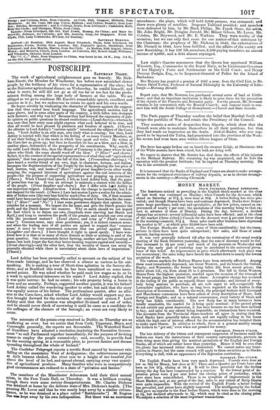POSTSCRIPT.
SATURDAY NIGHT.
The work of agricultural enlightenment goes on bravely. Mr. Bick- ham Ese,ott, the Member for Winchester, has before now astonished slower people by the boldness of his views for a representative of the class; but at the Ilminster agricultural dinner, on Wednesday, he outdid himself; and what is more, he still did not go at all too far or too fast for the predo- minant feeling among the large body of farmers at the table. We are obliged as we go to condense Mr. Escott's remarkable speech, excellent and concise as it is; but we endeavour to retain its spirit and his own words.
He began adroitly by vindicating the character of farmers against the supposi- tion that they cannot bear frank language. The agricultural societies had in some places, and in some other parts of the country, a little fallen into disrepute with farmers; and why was it? Because they had fettered the expression of pub- lic opinion on public questions by absurd restrictions—(Loadcheers)—whereas he was sure that here every man might express what each believed to be true, and that all would be best pleased by plainness and freedom of speech. (Cheers.) An allusion to Lord Ashley's "curious epistle" introduced the subject of the Corn- laws. "Lord Ashley is an able man, sees truly what is coining; but then, Lord Ashley is tainted with that which is the feeling of so many County Members, or, if not their feeling, it is the mode in which they speak and write. He writes of the Corn-law as given up; but then he describes its loss as a blow, and a blow, in another place, destructive of the prosperity of his constituents. Why, surely, if the noble Lord thinks this, then the House of Commons is the place where he and others who think the same should ward off the blow." (" Hear!" and cheers.) In fact, it is the conduct of the special representatives of what they call "agricultural epinions," that has precipitated the fall of this law. (Tremendous cheering.) "I have heard a worthy friend of my own, high in character, fortune, and station, harangue the Representatives of the People by the hour, deploring the low price of beef, mutton, veal, and lamb—(" Hear!" and great laughter)—in other words, arraying the supposed interests of agriculture against the real interests of the people—for the purpose of supporting agriculture and propping up protection! (Cheers.) When I heard that speech, I felt, as Lord Ashley feels, that the game of protection was up. It was an attempt to maintain a contest with the bellies of the people. (Great laughter and cheers.) But I differ with Lard Ashley in ene important respect. I dread no blow. I think the change is inevitable, but I do not despond for the result. (Cheers.) Late last session I gave a notice for the admis- sion of Indian corn (the very best food for stock) free of duty. Oh, if that measure could have been carried last session, what a blessing would it have been for the coun- try ! (" Hear!" and "No ! ") I hear some gentlemen dispute that opinion. Now, consider for a moment. We import the fat beast, and give the Dutch grazier the profit and the Dutch farmer the manure. Why on earth should we not import the food which is to fatten our own, (hundreds were starving last March and April) and keep to ourselves the profit of the grazier, and nourish our own crops with the increased mature? (Loud cheers, and cries of" That's common sense.") Common sense, says some gentleman; yes, it is indeed common sense; and when the leading men of all parties are agreed to support that common sense,' it must be very uncommon nonsense that can prevail against them. (Laughter and cheers.) I have thought it right to speak openly. I have won- dered how it is that at so many of these dinners so little or nothing is said of the great question. One recommends better farming, another advises the granting of e.s; but both forget the fact that better farming requires capital and security— (Great cheering)—and the other fact, that the security of leases can never be generally obtained while there is uncertainty about these laws of importation." (Cheers.)


























 Previous page
Previous page